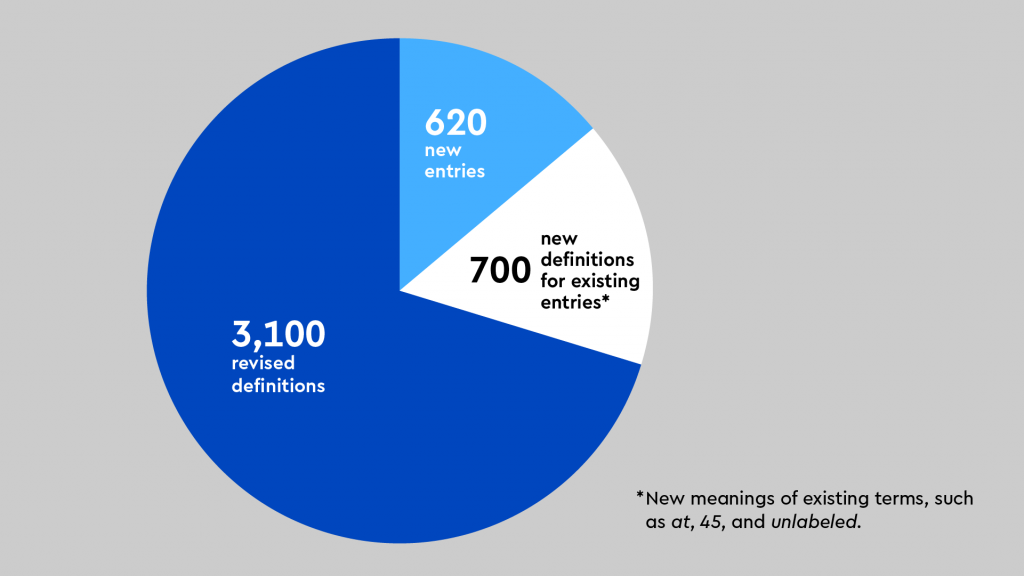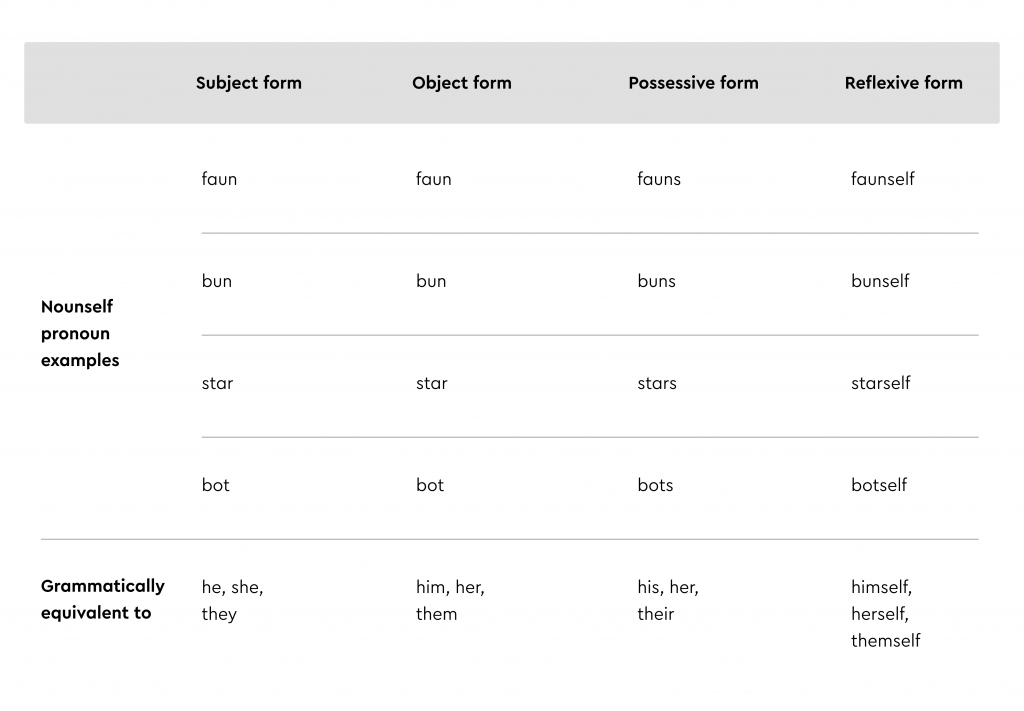Having a good vocabulary is important to facilitate speaking, reading, writing, and listening in any language.
Here are 60 new words in English with meanings to include in your list today!
Table of Contents
- An overview of new words in English
- Importance of new words in English
- New words in English (A-E)
- New words in English (F-J)
- New words in English (K-O)
- New words in English (P-T)
- Bonus words
- Key Takeaways
- FAQs
An overview of new words in English
Statistics by the Global Language Monitor (GLM) have revealed that there are approximately 1,019,729 words in the English language. The GLM also estimates that a new word is created almost every 98 minutes around the world! Being well-informed on the new words in English that have been added to recent editions of dictionaries can help you strengthen your vocabulary. Educators around the world classify vocabulary into four key types – listening vocabulary, speaking vocabulary, reading vocabulary, and writing vocabulary.
Importance of new words in English
The need to be able to communicate as clearly, concisely, and efficiently as possible has only been highlighted by the COVID-19 pandemic. With a significant portion of our daily life shifted online, having a remarkable collection of words to use in English can help create excellent language skills.
If you have decided to update your current vocabulary, here are 60 new words in English with meanings to help you refine your language skills!
| WORD | MEANING | |
| 1. | Abnegation | Denial; renunciation of a doctrine or belief. |
| 2. | Ambigue | An ambiguous expression or statement. |
| 3. | Athleisure | Comfortable and casual footwear & clothing designed for exercise and rigorous activity. |
| 4. | Broigus | Angry or irritated. |
| 5. | By-Catch | A catch of fish that cannot be put to commercial use. |
| 6. | Blert | A cowardly person, someone who is weak. |
| 7. | Comp | Providing products or services free of charge as a token of appreciation, a favor. |
| 8. | Cryptocurrency | Virtual or digital currency used on the internet. (This is among the new words in English that have emerged as a result of technological advancements in the industry of finance.) |
| 9. | Cringe | To feel ashamed or embarrassed by what someone else is doing or saying. |
| 10. | Deepfake | A recording or image that has been altered convincingly to misinterpret what someone is doing or saying. (This is among the new words in English that have emerged as a result of technological advancements in the industry of finance.) |
| 11. | Delicense | To deprive a vehicle, business, or person of their license (official permission to operate). |
| 12. | Destigmatizing | The process of removing social stigma or negative connotations associated with someone or something. |
| 13. | Eradicate | To destroy something completely down to its roots. |
| 14. | Ebullient | Unrestrained joyously. |
| 15. | Efface | To remove, typically by erasing or rubbing. |

New words in English (F-J)
| WORD | MEANING | |
| 16. | Fantoosh | Showy; flashy; stylish; exotic; sophisticated. Used often to imply pretentiousness & ostentation. |
| 17. | Functional | Capable of or designed for a particular purpose. |
| 18. | Fatuous | Devoid of intelligence. |
| 19. | Gratuitous | Unwarranted or uncalled for. |
| 20. | Gaffe | A tactless or socially-awkward act. |
| 21. | Galvanize | To stimulate action. |
| 22. | Hench | A person with strong musculature; an individual with a remarkable physique. |
| 23. | Hir | A gender-neutral adjective is used to indicate possession. |
| 24. | Hair Doughnut | A doughnut-shaped sponge used to support a specific hair-do. |
| 25. | Influencer | An individual who changes or affects the way a larger group of people behave. |
| 26. | Infirm | Lack of vitality, or bodily & muscular strength. |
| 27. | Incessant | Without any interruption. |
| 28. | Jovial | Displaying high-spirit merriment. |
| 29. | Jaunt | A journey taken typically for pleasure. |
| 30. | Jaded | Apathetic or bored after experiencing an excess of something. |
New words in English (K-O)

| WORD | MEANING | |
| 31. | Kwell | To talk proudly, admiringly, or enthusiastically about something. |
| 32. | Knell | The sound of a bell rung very slowly; a toll. |
| 33. | Kip | Informal word for ‘sleep’. |
| 34. | LOL | Abbreviated form for ‘Laugh Out Loud’. Used commonly for communicating informally on social media platforms. |
| 35. | Lethargy | To display an unusual lack of energy or inactivity. |
| 36. | Largesse | Generosity or kindness in bestowing money or gifts. |
| 37. | Multifarious | Diverse, or multifaceted. |
| 38. | Municipal | Related to a self-governing district. |
| 39. | Microfinance | Financial services that are provided to individuals & communities in rural & developing areas. |
| 40. | Nomophobia | Anxiety about lack of access to a smartphone or mobile phone services. |
| 41. | Naivete | Lack of worldliness & sophistication. |
| 42. | Nascent | The beginning; being born. |
| 43. | Onboarding | The process of integrating a new employee into a team or organization. |
| 44. | Oat-Milk | Milk prepared from oats; used commonly in cooking and in drinks. |
| 45. | Onset | The early stages, or beginning of. |
New words in English (P-T)
| WORDS | MEANING | |
| 46. | Pronoid | A person who is convinced of others’ goodwill towards themselves. |
| 47. | Puggle | A young platypus or echidna. |
| 48. | Pertinacious | Someone who is stubborn & unyielding. |
| 49. | Quotidian | An event or task that is of daily occurrence. |
| 50. | Quisling | A traitor. (This word is also among the list of 50 difficult words in the English language!) |
| 51. | Quaff | To swallow greedily or hurriedly in a single draught. |
| 52. | Rat-Tamer | Informal for a psychiatrist or a psychologist. |
| 53. | Recalcitrant | Resistant to authority or force. |
| 54. | Raconteur | A person who is skilled in telling anecdotes. |
| 55. | Sandboxing | The restriction of a code or piece of software to a specific environment on a computer system that can be run securely. |
| 56. | Self-isolate | To deliberately isolate oneself from others; to undertake a period of self-imposed isolation. |
| 57. | Shero | A heroine; a hero of the female gender. |
| 58. | Topophilia | An emotional connection to a physical environment or a particular place. |
| 59. | Truthiness | Something of a seemingly truthful quality that is not supported by evidence or facts. |
| 60. | Tract | An area of land that is extended. |
Bonus words
- Abrogate– To revoke something formally.
- Abstruse– Difficult to understand.
- Accede- Yield to anothers’ wish or opinion.
- Blandishment– Flattery intended to persuade.
- Calumny– A false accusation of an offense.
- Circumlocution– An indirect way of expressing something
- Demagogue– A leader who seeks support by appealing to popular passions
- Enervate– Weaken physically, emotionally, or morally.
- Sesquipedalian– A foot and a half long.
- Supercalifragilisticexpialidocious– Something that is extraordinarily good.
Key Takeaways
- There is a constant introduction of new words in English added to dictionaries every year.
- Updating your vocabulary is an excellent way to communicate effectively.
- Vocabulary is recognized as of four types – reading, speaking, listening, and writing.
- The above list of words is a great way to improve your all-rounded vocabulary and knowledge of new English words!
We hope you enjoyed reading this blog. In case of any queries, reach out to us or drop a comment below!
Liked this blog? Read 5 English learning books to boost your language skills
FAQs
Q1. How can I learn new words daily?
Answer – Reading different kinds of material and literature is an excellent way to learn new words. Keep a dictionary handy, so you can refer to the meanings of the words. This can also help you remember them easily.
Q2. Why has there been a surge in the new words added to dictionaries every year?
Answer – Technology has played a significant role in promoting the spontaneous coining of new words. This is largely due to the need to communicate quickly and efficiently.
Q3. What are ‘portmanteau’ words?
Answer – ‘Portmanteau’ words or ‘blended’ words are words that combine the meaning of two discrete terms. For example – the word ‘bromance’ is a blend of the words ‘brother’ and ‘romance.’
Antiwork, bachelorx party, 45, Ohtani rule, pawternity leave, Zelenskyy. As ever, there is great variety in the new terms and meanings just added to Dictionary.com.
by Nick Norlen, Senior Editor, and Heather Bonikowski, Lexicographer
Let’s set things straight: a word doesn’t become a “real word” when we add it to the dictionary. It’s actually the other way around: we add a word to the dictionary because it is a real word used by real people in the real world.
And you—the real people in this real, complicated world—have been busy generating a wildly diverse assortment of new words and new ways to use existing words for countless aspects of our modern life.
As always, we’ve been keeping track. That’s our job! The work of a dictionary is to document these changes.
Learn more about how new words get added to Dictionary.com—and how the dictionary works.
Many of the words may be new to you. Others you have already been using for some time. (Don’t at us.) Either way, that’s how words work. That’s how the dictionary works. We strive to keep pace with the ever-changing English language—a language whose changes come from you, the people who use it.
What’s in this dictionary update
This update is not just new entries. It also includes, as always, new and revised senses of existing words in our dictionary. Here’s the breakdown for this release:
Our lexicography team has also recently begun to do the work of revising entries for Ukrainian place names and the names of Indigenous Peoples. You can read about both below in the special section titled “Endonyms & Exonyms.”
Now, let’s get to the newly added words and meanings. Note that many of these terms have more than one definition. We’ll be highlighting the most prominent or notable meanings relevant to this release.
Lie Flat
verb. to reject overwork and withdraw voluntarily from relentless competition and pressure to achieve.
🧐 Editor’s note: The term comes from—and is also a synonym for—the name of the movement known as Lying Flat that originated in China.
antiwork
adjective. of or relating to a social and cultural movement that distinguishes between labor, which generates goods, and work, which generates wealth, and that rejects work as artificially incentivized, while embracing or elevating labor as essential or intrinsically rewarding.
churn rate
noun. the percentage of employees that leave a company in a given period of time, or the rate at which any group loses members.
golden handcuffs
plural noun. incentives like bonuses, raises, insurance plans, and flexible hours that discourage employees from leaving a company.
OOO
abbreviation. out of office: used as a notification to colleagues or clients when an employee is on vacation, out sick, or away from the office for another reason, and cannot be reached.
pawternity leave
noun. a brief leave of absence for employees who are adding a new pet to their household, caring for a pet when it is sick or injured, or mourning the death of a pet.
lavender ceiling
noun. an upper limit to professional advancement imposed upon LGBTQ+ people that is not readily perceived or openly acknowledged.
🧐 Editor’s note: This term is modeled on glass ceiling. The word lavender has a history of being used to represent the LGBTQ+ community.
simp
noun. a person, especially a man, who is excessively attentive or submissive to an object of sexual attraction.
verb. to be excessively attentive or submissive, especially to an object of sexual attraction.
Example: Why do you simp for him when he doesn’t even notice you?
🧐 Editor’s note: Yes, we know, you may have already learned this word years ago from your nephew, who probably no longer uses it. It’s actually even older than you think, originating at least from the 1980s in hip-hop—another example of a term from Black culture being taken up by the mainstream in a way that obscures or erases its origins. We expect use of simp to continue and evolve (likely by becoming more general), perhaps differentiating it from other recent slang terms that rapidly became very popular but were then mostly yeeted from the lexicon. It’s important to note that the word is criticized, among other reasons, for its sexist implications, specifically when applied to men, for reinforcing the idea that women are sexual objects, and that men are “weak” if they show any deference toward or consideration of women.
at
verb. to argue with someone, or dispute someone’s stated views, especially on social media.
Example: The sequel was better than the original—don’t at me!
🧐 Editor’s note: Lexicographers get excited whenever they get to add a meaning to a word as common, basic, and old as at. Its most recent sense originated from the @ symbol in social media usernames, which can be used to tag someone, such as when calling them out for some opinion they’ve stated. In this case, adding this verb sense of at to the dictionary also meant that the lexicographers had to research how the different tenses are spelled in the wild. For example, the past tense can be @ed or at-ed. At us if you want, but that’s how people use it.
bodycon
adjective. (of clothing) designed to be close-fitting, and often made with stretchy material, so as to display the shape of the body; skintight.
bottle episode
noun. an episode of a television series set in a single limited or confined location, such as a hotel room or a broken elevator, and often using only a few regular cast members, sometimes undertaken as a cost-cutting measure or as a creative challenge.
hopepunk
noun. a subgenre of speculative fiction and art that shows optimism, gentleness, kindness, and collaboration to be effective weapons in the fight to create a better future.
grimdark
noun. dystopian fantasy fiction characterized by harsh settings, extreme violence, and a bleak, fatalistic perspective on the future of humanity.
Harness that dark vibe by entering our Haunting Hooks Scary Story Opener Writing Contest. This year’s theme: Sci-Fi. Enter here.
brigading
noun. the practice of organizing or participating in a coordinated campaign of online harassment against a targeted individual or group, especially on social media.
review bomb
noun. to manipulate an online rating system with a semiorganized campaign of unfavorable user reviews, often as a general statement of disapproval for a creator, a publisher, or other business, rather than a genuine opinion about a specific product or experience.
Example: The game was review bombed by angry players after the publisher blocked fan-created content.
shadow ban
noun. the suppressing from public view of a social media post or posts by platform moderators, without notifying the user who published the content, usually in response to a violation of the platform’s terms of service.
sock puppet
noun. a false name or identity assumed by an internet user, often to deceive or to preserve the user’s anonymity.
🧐 Editor’s note: This sense of sock puppet emerged in the early 2000s and continues to have relevance. A recent prominent use relates to Russian online disinformation campaigns.
Ohtani rule
noun. a rule that allows the pitcher to be assigned to the designated hitter spot in the batting order and to remain as the designated hitter even if replaced on the mound by another pitcher.
🧐 Editor’s note: The rule, made official by Major League Baseball in 2022, is named for MLB phenom Shohei Ohtani, whose exceptional performance as both a pitcher and a hitter gave rise to it.
ghost runner
noun. a runner who is automatically placed on second base at the beginning of each half of an extra inning, before any pitch is thrown.
pickleball
noun. a game, similar to tennis and badminton, played indoors or outdoors on a court with a low net, using a short-handled, lightweight paddle and a perforated plastic ball.
dyslexic thinking
noun. an approach to problem solving, assessing information, and learning, often used by people with dyslexia, that involves pattern recognition, spatial reasoning, lateral thinking, and interpersonal communication.
🧐 Editor’s note: Read more about how we added dyslexic thinking to the dictionary—and how it was added as a skill on LinkedIn.
stimming
noun. the repetition of physical movements or articulated noises exhibited by people, especially young children and those with autism spectrum disorders, in reaction to a mental or emotional state.
Example: Stimming, like covering my ears while repeating a sound, can soothe intense feelings and bring back my sense of control.
🧐 Editor’s note: This term is new to our dictionary, but it’s actually been in use since at least the 1980s. Its addition reflects an overdue focus on neurodiversity and the terms used by neurodiverse people themselves. Part of this focus is the important acknowledgement that the ways people experience neurodiversity vary widely, as do the associations that often accompany words like stimming, which may be positive for some but negative for others.
social-emotional learning
noun. the process of acquiring interpersonal and emotional skills such as empathy, cooperation, conflict resolution, self-awareness, and self-control. Abbreviation: SEL.
bachelorx party
noun. an inclusive pre-wedding party, often on the night before or in the days leading up to the wedding, and ranging from a night of drinking to a destination vacation (used in contrast to bachelor party and bachelorette party, and intended to be welcoming for wedding participants and guests of any gender).
See also: bachelorx.
🧐 Editor’s note: Bachelorx is another example of the recent practice of using the letter x to create gender-neutral terms, as seen in words like Latinx and Mx.
neopronoun
noun. a type of gender-neutral pronoun, coined after 1800, and used especially by nonbinary and genderqueer people, as in English ze/hir/hirs, e/em/eirs, or xe/xem/xyrs.
nounself pronoun
noun. a type of invented gender-neutral pronoun used by some nonbinary and genderqueer people in place of gendered pronouns such as he/himself or she/herself to express a spiritual or personal connection to a specific concept: the nounself pronoun is derived from a word, usually a noun, that is linked to that concept, such as the use of star/starself by people who feel a connection to celestial objects or bun/bunself, derived from bunny, by people who feel a connection to rabbits.
Example: Orion chose stars nounself pronouns as one way to remind starself that star is always connected to the sky above star.
Here are just a few examples of nounself pronouns and their different grammatical forms.
aromantic
adjective. noting or relating to a person who experiences little or no romantic attraction to other people.
demisexual
adjective. noting or relating to a person who is sexually attracted only to people with whom they already have an emotional bond.
masculine of center
adjective. noting or relating to a person, especially an LGBTQ+ person, who is more masculine than feminine on a spectrum of gender expression.
feminine of center
adjective. noting or relating to a person, especially an LGBTQ+ person, who is more feminine than masculine on a spectrum of gender expression.
unlabeled
adjective. noting or relating to a person who does not name their gender or sexuality.
sologamy
noun. the practice or state of marriage to one’s self.
Endonyms & Exonyms
Maintaining a dictionary involves more than just adding words. In recent months, our lexicography team has worked to make revisions to entries involving endonyms and exonyms, particularly for Ukrainian places and Indigenous names.
🤔 Did you know?
An endonym is a name that an ethnic, racial, or social group uses for itself or its language; it can also mean a name used to refer to a place by its inhabitants (endo- means “within”; -nym means “name”).
In contrast, an exonym is a name used by outsiders (exo- means “outside”).
Ukrainian place names and pronunciations
More than 40 entries involving Ukrainian place names were either added or updated to reflect and prioritize the Ukrainian spellings or pronunciations (rather than the Russian versions that have traditionally been recorded). Examples include:
- Chornobyl
- Dnipro
- Kharkiv
- Luhansk
- Lviv
- Odesa
Entries with Russian-spelled Ukrainian place names are now specifically defined as such and cross-referenced to the primary entries with Ukrainian spellings.
Indigenous names
In the context of Indigenous names, changes include the addition of names that Indigenous Peoples use for themselves (as opposed to names applied to them by others, many of which persist in outside use today). In addition, several entries have been revised to show the endonym as the primary spelling and pronunciation. Examples include Mi’kmaq, Ojibwe, and CHamoru.
In some cases, more than one name is used by members of a community. As explained in the language note for the newly added term Diné, the name comes from the Native Athabascan language of the people also known as the Navajo. It is preferred by many over Navajo, a name assigned by Spanish missionaries. Nevertheless, Navajo and Navaho are still in use and remain acceptable.
Our work to properly reflect endonyms is ongoing.
decarbonize
verb. to reduce the amount of carbon dioxide or other carbon compounds emitted into the atmosphere by the activities of (a household, industry, country, etc.).
pancake ice
noun. a grouping of circular, flat pieces of ice with raised rims, formed by the accumulation of frazil and slush on the surface water of seas and large lakes.
Zelenskyy
noun. Volodymyr Zelenskyy, born 1978, president of Ukraine since 2019.
🧐 Editor’s note: The ending of this transliterated spelling uses two y’s to represent a specific y sound in Ukrainian (which has more than one). It’s also the spelling that Zelenskyy himself prefers. Still, you’re likely to see the name spelled with one y in some news reports, reflecting a different transliteration.
45
noun. an identifier of or nickname for Donald Trump, the 45th U.S. president, alternately used with disparaging intent by opponents and with affection by supporters.
🧐 Editor’s note: This term follows the practice of referring to presidents—including both current and former—by their number in the progression of presidencies. The widespread use of 45 to refer to Donald Trump (by both supporters and opponents, as noted in the definition) is evidence of his continued prominence in political discussion and the news.
shadow docket
noun. a list of the cases resolved by the U.S. Supreme Court by unsigned procedural orders issued without full briefing, oral arguments, or lengthy written opinions. Compare merits docket.
🧐 Editor’s note: The term shadow docket is typically used in a way that implies criticism of the practice. A more neutral term for the same thing is orders docket. The word shadow adds this shade of meaning to other terms as well, often indicating that the thing being referred to is unofficial, secret, or difficult to detect. Notably, it appears in two other terms on this list: shadow inflation and shadow ban.
shadow inflation
noun. the phenomenon of decreasing quantity or diminishing quality of goods and services compared to a comparable purchase that previously had more value at the same price point.
shrinkflation
noun. a decrease over time in quantity or in package size compared to the quantity previously sold at the same price point, resulting in a higher cost per unit for the consumer.
school resource officer
noun. an on-site law enforcement officer responsible for safety and crime prevention at a school. Abbreviation: SRO.
kettling
noun. a crowd control technique, in which a line of police officers encircles demonstrators and confines them in a contained area known as a kettle.
air hug
noun. the gesture of extending one’s arms as if to embrace another person (used as a greeting or expression of affection without physical contact when a physical hug is not possible or not appropriate).
mompreneur
noun. a woman who is the primary caregiver to her young child or children and also manages her own business.
🧐 Editor’s note: These final three highlights aren’t new or even recent—sometimes it just takes a while for an obscure word to get on our radar (but we’re glad they did!). Why are all three p-words? Just a coincidence.
pogonophile
noun. a person who likes beards.
pareidolia
noun. the illusory perception of meaningful patterns or images of familiar things in random or amorphous data, as a face seen on the moon.
psithurism
noun. a rustling or whispering sound, such as leaves in the wind; susurration.
Example: The psithurism from the breeze blowing through the Spanish moss made me picture the tree trunks as faces with windswept beards, but that’s because I’m a pogonophile prone to pareidolia.
| New English Word | Meaning |
|---|---|
| A-game | One’s highest level of performance |
| ambigue | An ambiguous statement or expression. |
| Anglosphere | English-speaking countries considered collectively (the United Kingdom, the United States, Canada, Australia, and New Zealand, and Ireland). |
| anti-suffragism | Opposition to the extension of the right to vote in political elections to women; the political movement dedicated to this. |
| Aperol | A proprietary name for an orange-coloured Italian aperitif flavoured with gentian, rhubarb, and a variety of herbs and roots. |
| April Fool’s | April Fool’s Day (1 April), a day on which tricks or hoaxes are traditionally perpetrated |
| ar | Used to express a range of emotions or responses, esp. affirmation, assent, or agreement. |
| arr | In humorous representations of the speech of pirates expressing approval, triumph, warning, etc. |
| assault weapon | A weapon designed for use in a large-scale military assault, esp. one used to attack a fortified or well-defended location. |
| athleisure | Casual, comfortable clothing or footwear designed to be suitable for both exercise and everyday wear |
| Aucklander | A native or inhabitant of city or region of Auckland, New Zealand. |
| awedde | Overcome with anger, madness, or distress; insane, mentally disturbed. |
| awe-inspiringly | So impressively, spectacularly, or formidably as to arouse or inspire awe. |
| awesomesauce | Extremely good; excellent. |
| awfulize | To class as awful or terrible |
| awfy | Terrible, dreadful; remarkable or notable. |
| awfy | As simple intensive; very, exceedingly, extremely. |
| bidie-in | A person who lives with his or her partner in a non-marital relationship; a cohabiting partner. |
| bigsie | Having an exaggerated sense of one’s own importance; arrogant, pretentious, conceited. |
| bok | A South African |
| broigus | Angry; irritated |
| bukateria | A roadside restaurant or street stall with a seating area, selling cooked food at low prices. |
| by-catch | A catch of unwanted fish |
| cab sav | Red wine made from the Cabernet Sauvignon grape |
| cancel culture | Call for the withdrawal of support from a public figure, usually in response to an accusation of a socially unacceptable action or comment. |
| chicken finger | A narrow strip of chicken meat, esp. from the breast, coated in breadcrumbs or batter and deep-fried. |
| chicken noodle soup | A soup made with chicken and noodles, sometimes popularly regarded as a remedy for all ailments or valued for its restorative properties |
| chickie | Used as a term of endearment, especially for a child or woman |
| chipmunky | Resembling or characteristic of a chipmunk, typically with reference to a person having prominent cheeks or a perky, mischievous character. |
| chuddies | Short trousers, shorts. Now it usually means underwear; underpants. |
| contact tracing | The practice of identifying and monitoring individuals who may have had contact with an infectious person |
| contactless | Not involving contact (physical and technological meanings of contactless are being used much more frequently). |
| coulrophobia | Extreme or irrational fear of clowns |
| Covid-19 | An acute respiratory illness in humans caused by a coronavirus, which is capable of producing severe symptoms and death, esp. in the elderly |
| deepfake | An image or recording that has been convincingly altered to misrepresent someone as doing or saying something that was not actually done or said |
| de-extinction | The (proposed or imagined) revival of an extinct species, typically by cloning or selective breeding. |
| deleter | A person who or thing which deletes something. |
| delicense | To deprive (a person, business, vehicle, etc.) of a license providing official permission to operate |
| denialism | The policy or stance of denying the existence or reality of something, esp. something which is supported by the majority of scientific evidence. |
| denialist | A person who denies the existence or reality of something, esp. something which is supported by the majority of scientific or historical evidence |
| destigmatizing | The action or process of removing the negative connotation or social stigma associated with something |
| dof | Stupid, dim-witted; uninformed, clueless. |
| droning | The action of using a military drone or a similar commercially available device |
| e-bike | An electric bike |
| eco-anxiety | A state of stress caused by concern for the earth’s environment |
| enoughness | The quality or fact of being enough; sufficiency, adequacy. |
| Epidemic curve | A visual representation in the form of a graph or chart depicting the onset and progression of an outbreak of disease in a particular population |
| e-waste | Worthless or inferior electronic text or content |
| fantoosh | Fancy, showy, flashy; stylish, sophisticated; fashionable, exotic. Often used disparagingly, implying ostentation or pretentiousness. |
| forehead thermometer | A thermometer that is placed on, passed over, or pointed at the forehead to measure a person’s body temperature. |
| franger | A condom. |
| hair doughnut | A doughnut-shaped sponge or similar material used as the support for a doughnut bun or similar updo |
| hench | Of a person having a powerful, muscular physique; fit, strong. |
| hir | Used as a gender-neutral possessive adjective (his/her/hir watch). In later use often corresponding to the subjective pronoun ze (he/she/ze wears a watch). |
| hygge | A Danish word for a quality of cosiness that comes from doing simple things such as lighting candles, baking, or spending time at home with your family |
| influencer | Someone who affects or changes the way that other people behave: |
| jerkweed | An obnoxious, detestable, or stupid person (esp. a male). Often as a contemptuous form of address. |
| kvell | Meaning to talk admiringly, enthusiastically, or proudly about something |
| kvetchy | Given to or characterized by complaining or criticizing; ill-tempered, irritable. |
| LOL | To laugh out loud; to be amused. |
| macaron | A confection consisting of two small, round (usually colourful) biscuits with a meringue-like consistency |
| MacGyver | To construct, fix, or modify (something) in an improvised or inventive way, typically by making use of whatever items are at hand |
| mama put | A street vendor, typically a woman, selling cooked food at low prices from a handcart or stall. Also a street stall or roadside restaurant. |
| mentionitis | A tendency towards repeatedly or habitually mentioning something (esp. the name of a person one is infatuated with), regardless of its relevance to the topic of conversation |
| microtarget | To direct tailored advertisements, political messages, etc., at (people) based on detailed information about them |
| misgendering | The action or fact of mistaking or misstating a person’s gender, esp. of addressing or referring to a transgender person in terms that do not reflect… |
| next tomorrow | The day after tomorrow. |
| oat milk | A milky liquid prepared from oats, used as a drink and in cooking |
| onboarding | The action or process of integrating a new employee into an organisation, team, etc |
| patient zero | Is defined as a person identified as the first to become infected with an illness or disease in an outbreak |
| pronoid | A person who is convinced of the goodwill of others towards himself or herself |
| puggle | A young or baby echidna or platypus. |
| puggle | A dog cross-bred from a pug and a beagle; such dogs considered collectively as a breed. |
| quilling | The action or practice of bribing electors in order to gain their votes, especially by providing free alcohol |
| rat tamer | Colloquial meaning for a psychologist or psychiatrist |
| report | An employee accountable to a particular manager |
| sadfishing | Colloquial the practice adopted by some people, especially on social media, of exaggerating claims about their emotional problems to generate sympathy |
| sandboxing | The restriction of a piece of software or code to a specific environment in a computer system in which it can be run securely |
| schnitty | Colloquial a schnitzel, especially a chicken schnitzel |
| Segway | A proprietary name for a two-wheeled motorised personal vehicle |
| self-isolate | To isolate oneself from others deliberately; to undertake self-imposed isolation for a period of time |
| shero | A female hero; a heroine. |
| single-use | Designed to be used once and then disposed of or destroyed |
| skunked | Drunk, intoxicated. In later use also under the influence of marijuana |
| slow-walk | To delay or prevent the progress of (something) by acting in a deliberately slow manner |
| social distancing | The action of practice of maintaining a specified physical distance from other people, or of limiting access to and contact between people |
| stepmonster | Colloquial (humorous) (sometimes derogatory) a stepmother |
| tag rugby | A non-contact, simplified form of rugby in which the removal of a tag attached to the ball carrier constitutes a tackle |
| theonomous | Ruled, governed by, or subject to the authority of God |
| thirstry | Showing a strong desire for attention, approval, or publicity. |
| title bar | A horizontal bar at the top of a program window, used to display information such as the name of the program in use, the file or web page that is active. |
| topophilia | Love of, or emotional connection to, a particular place or physical environment |
| truthiness | A seemingly truthful quality not supported by facts or evidence |
| UFO | UnFinished Object: In knitting, sewing, quilting, etc.: an unfinished piece of work |
| unfathom | To come to understand (something mysterious, puzzling, or complicated); to solve (a mystery, etc.) |
| weak sauce | That lacks power, substance, or credibility; pathetic, worthless; stupid. |
| WFH | An abbreviation for “working from home.” |
| WIP | Work in progress |
| zoodle | A spiralised strand of zucchini, sometimes used as a substitute for pasta |
In our day-to-day lives, there are so many English words we use, many words we hear, and many more that we come across and learn. With new words being added to the dictionary every day, knowing all the words is not possible. However, it’s always a fun and useful practice to learn new English words with meanings, especially if you’re planning on studying abroad.
But first…when does a new word get added to the dictionary? A new English word gets added when used by many people, and everyone agrees that it has the same meaning. You must already be familiar with the fact that many English slang words like ‘LOL’, or ‘banana bread’, have recently been added to the dictionary. In this article, you’ll come across many more new words with meanings and sentences which will help expand your vocabulary with time.
Is it important to improve your vocabulary in preparation for competitive exams? Is it really worth your time to go through this? The obvious answer is YES. A strong vocabulary may push you forward in both competitive examinations and life. Here’s a complete list of new vocabulary words with meanings that we think will help you for your study abroad journey and beyond.
1. Abnegation
Renunciation of a belief or doctrine; Denial
Sentence Monks practice abnegation of the material aspects of human life.
2. Aggrandize
To enhance power, wealth, or status
Sentence: A generous grant, enabled the library to significantly aggrandize its collection of books on tape.
3. Fatuous
Devoid of intelligence
Sentence: Ignoring the avalanche warnings, the fatuous skiers continued on their course
4. Gratuitous
Uncalled for or unwarranted
Sentence: The film was criticized for its gratuitous violence.
5. Iconoclast
Someone who criticizes or attacks cherished ideas and beliefs
Sentence: Notorious as an iconoclast, that music critic isn’t afraid to go after sacred cows.
6. Idiosyncratic
Something peculiar to an individual
Sentence: His teaching methods are idiosyncratic but successful.
7. Incumbent
A person who is currently in an official position.
Sentence: He defeated the incumbent governor by a large plurality.
Know About Study Abroad in the Uk
8. Inveterate
Habitual
Sentence: He has an inveterate tendency to tell some very tall tales
9. Libertarian
Someone who cherishes ideas of free will
Sentence: This pinpoints a fundamental weakness in the libertarian defence of a market economy.
10. Licentious
Someone who is promiscuous
Sentence: A moralist who decried what she regarded as the licentious and corrupt culture of the entertainment industry
11. Largesse
Kindness or generosity in bestowing gifts or money
Sentence: He relied on the largesse of friends after he lost his job.
12. Multifarious
Multifaceted or diverse
Sentence: Spain is a composite of multifarious traditions and people.
13. Obdurate
Being stubborn and refusing to change one’s opinion
Sentence: He is known for his obdurate determination.
14. Ostracism
Excluding a person or certain section from society by the majority’s consent
Sentence: She broke taboos, risking ostracism and derision in the process.
If you are an international student who needs help with student accommodation or student loans, make sure you check out the banners in this blog.
15. Pejorative
Showing disapproval
Sentence: While the detective was supposed to be neutral, he described the suspect in a pejorative manner.
16. Pertinacious
Someone who is stubbornly unyielding
Sentence: A pertinacious little boy who was determined to catch and collect reptiles
17. Phlegmatic
Expressing little or no emotion
Sentence: The British character is often said to be phlegmatic.
18. Promulgate
To broadcast or announce
Sentence: Her ideas have been widely promulgated on the Internet.
19. Quotidian
Something that is of daily occurrence
Sentence: So far, so fairy tale, but the story drifts back into the quotidian details of village life.
20. Recalcitrant
Resistant to authority
Sentence: For anyone who has ever struggled to extract a recalcitrant cork from a bottle … the value of a good corkscrew is a given.
21. Sanctimonious
The pretence of being morally pious to exhibit moral superiority
Sentence: Leaders should deliver the message without sounding sanctimonious so everyone hears it and doesn’t tune out.
22. Solipsism
The philosophical theory that only self-existence is known and all that exists
Sentence: Dressing for me has often been a mixture of safe and pleasurable solipsism, alongside a process of curating something interesting.
23. Travesty
Distorting facts or imitation
Sentence: The trial was a travesty of justice.
24. Ubiquitous
Omnipresent or existing everywhere
Sentence: Apple is working to make Siri a little more ubiquitous, and to that end, is finally opening Siri up to third-party devices.
25. Vicissitude
An unwelcome or unpleasant change in circumstances or fortune
Sentence: He experienced several great social vicissitudes in his life.
26. Vociferous
Something or someone who is offensively/conspicuously loud
Sentence: He was vociferous in his support of the proposal.
27. Construe
To construe something is to interpret or assign meaning to it.
Sentence: Your helpful behaviour may be construed as interference by others.
28. Mendacious
To not tell the truth; deceitful
Sentence: What we see, hear, smell and touch is not necessarily mendacious; it’s the conclusions we draw from those observations that may be inaccurate.
29. Athleisure
A fashion trend distinguished by athletic clothing that is both comfortable and alluring
Sentence: Athleisure looks great whether you’re working out or going about your daily business.
30. Beseech
Asking someone to do something immediately or imploring them to do it
Sentence: She realised that it was the perfect time to beseech the former FBI agent for assistance.
31. Scrutinise
To carefully or critically study in great detail.
Sentence: When planning your next tactics, it is advisable to carefully scrutinize your opponent’s moves.
Conclusion:
Learning new English words with meanings is very useful and comes in handy at many stages for a student from the time of their application process to applying for jobs. Many countries give visas after clearing English-based examinations for citizenship etc. In many fields or streams such as in Bank exams, SSC, IBPS, etc. it is important to have knowledge of basic English.
FAQs
What are some beautifully rare words?
There are several beautiful yet rare words in English which include – ‘Zephyr’ which means a calm gentle breeze, ‘Eunoia’ which means beautiful thinking, ‘Fika’ which means a moment to slow down and appreciate the beautiful things in life and ‘Philocalist’ which means a lover of beauty are some of the rare worlds with beautiful meanings.
What are some soft words?
Velvet-brushed, cushiony, cottony, downy, downlike, fully and fleecy are some of the words that describe softness in various ways. These words can be used interchangeably in some cases or most of them.
What are some happy words?
Ecstatic, elated, jubilant, merry, upbeat, chipper, convivial, exultant, delighted, blissful and glad are some of the words used to describe happiness.
What are some classy words?
Labyrinth, ineffable, incendiary, ephemeral, cynosure, propinquity, infatuation, incandescent, eudaemonia and raconteur are some of the classy words used in English with beautiful meanings.
What are very uncommon words?
Anachronism, accismus, cacophony, draconian, limerence, pareidolia, riposte and sanctimony are some of the uncommon words in English.
Thank you for reading this blog on the 26 New English Words With Meanings And Sentences. If you’d like to read more, check this out:
- Popular FAQs On What To Do If You Get A 2:2 Degree
- The Ideal Personal Statement For UCAS
- Here’s Everything You Need To Know About Verbal Communication

By
Last updated:
March 26, 2022
The English language is very much alive and growing, with more new words added to the dictionary every year. Today, we’re going to learn 25 brand-new English words that native speakers use all the time.
But before we get to that list, you may be wondering where new English words come from, and some quick tips to master them in the shortest time possible.
Contents
- Where Do New Words Come From?
- The Quickest Ways to Master New English Vocabulary
- Trendy English Words Worth Learning in 2022
-
- 1. To Chillax
- 2. Whatevs
- 3. Freegan
- 4. Hellacious
- 5. Awesomesauce
- 6. Cringe
- 7. Stan / To Stan
- 8. Sober-curious
- 9. B-day
- 10. Beardo
- 11. Sriracha
- 12. Ghost
- 13. EVOO
- 14. Manspread
- 15. Facepalm
- 16. Froyo
- 17. Hangry
- 18. Photobomb
- 19. Binge Watch
- 20. Fitspiration
- 21. Mansplain
- 22. Glamping
- 23. Side-eye
- 24. Fast Fashion
- 25. Staycation
Download:
This blog post is available as a convenient and portable PDF that you
can take anywhere.
Click here to get a copy. (Download)
Where Do New Words Come From?
Every year, hundreds of new words are added to the English dictionary. Of course, not all new words make it into the dictionary. The ones that do are those that have been used frequently in a wide range of contexts and are found to be useful to English communication.
New English words may come from foreign words that have been adapted into the English language over time. For instance, if you love spicy food, you’ll be pleased to know that the word sriracha (a spicy chili and garlic sauce invented in Thailand) has been added to the dictionary.
Some new words are actually old words that have been given new or additional meanings. For example, ghost is no longer a word you only use around Halloween time, to refer to a spirit. It now has an additional meaning, which we’ll show you in our list below.
New slang words aren’t just old words used in new ways. New words may also be formed from the blending or shortening of certain words or phrases. For instance, a key ingredient in Italian cuisine is extra virgin olive oil—it’s a real tongue twister, but thankfully, it’s now been shortened to simply EVOO as you’ll see soon.
Or you can learn more about this right now, if you want a learn 12 of the twenty-five trendy words below via video.
The Quickest Ways to Master New English Vocabulary
- Make your own personal dictionary: One of the most effective ways to master English vocabulary is to create your own dictionary of words that are most important or difficult for you. Write down a list of new words you wish to learn and make notes about their meanings and usages.
Mastering new vocabulary takes time and practice, so be sure to keep your personal dictionary with you to reference and refresh your memory whenever you need to. This will help prevent you from forgetting words easily.
- Watch authentic English-language media. Watching, reading, or listening to authentic English-language content is a fantastic way to learn the words and phrases native speakers use every day in context.
Thankfully, there are many platforms with subtitled videos for you to choose from. FluentU, for example, is a language learning app and website based on authentic English-language videos. Each video has interactive subtitles that you can click on for example sentences, pronunciation, and more, which could help you expand your vocabulary and learn words in context.
- Talk to people: Another way to master new vocabulary is to use the words in real English conversations. The more you repeat the word, the more fluent you’ll become at using it. By talking to native English speakers, you’ll also pick up new vocabulary from them. Now that’s a bonus!
Here are some great tips to find English speaking partners no matter where you currently live.
Trendy English Words Worth Learning in 2022
1. To Chillax
If you blend (mix) the words chill (relaxed) and relax, you get the verb to chillax.
This word has become more and more common on the internet over the past couple of years, and it simply means to relax, to become calm or to take it easy.
Although people use it almost with the same meaning as to relax, I find chillax has more of a sarcastic meaning, as in “wow, calm down, this isn’t so serious, you’re overreacting.”
No matter the meaning it can have for different people, remember that this word is used in slang, so don’t go telling your boss or your teacher to chillax!
Hey man, just chillax! It’s just a horror movie, not the end of the world!
2. Whatevs
Whatevs is an informal word that means whatever.
I’ve normally seen it used in sentences in which the speaker wants to express irony and show they don’t care about what’s happening or being said.
You’ll normally see whatevs as a standalone interjection or at the end of sentences:
“I don’t love you anymore.”
“Whatevs… Bye!”
She didn’t give me the lipstick back, but whatevs.
3. Freegan
Freegans and freeganism have been popular for years, but it’s only recently that we’ve gotten a word to describe who and what they are.
Simply put, a freegan is a person who tries to buy a little as possible, uses discarded things and/or (especially) food, and recycles everything they can. They’re environmentally conscious and friendly, and they do their best to reduce waste.
Although this is a positive thing for the Earth, some people take it to the extreme. It’s because of this that the words freegan and freeganism are normally surrounded by negative connotations (associations, suggestions).
He became a freegan five years ago and hasn’t bought food ever since.
4. Hellacious
This word is a mix of the word hell and the suffix -cious, which is quite common in English (delicious, conscious, audacious, tenacious, etc.).
Hellacious can have different meanings, but it is normally used as an adjective meaning astonishing, remarkable or very difficult.
This word is obviously slang, so use it only in the appropriate contexts!
He got a hellacious amount of hate from his last post.
They got a hellacious time trying to leave the country in one piece.
5. Awesomesauce
Put together the words awesome and sauce and you will get awesomesauce, which basically has the same meaning as awesome with a pinch of even more awesomeness.
This slang word can be used in any informal situation, and it works like a normal adjective:
I’m reading an awesomesauce book about the influence of slang words in the English language. How am I doing?
6. Cringe
Have you ever heard someone say something so embarrassing you even felt sorry for them?
Have you been present in a situation where someone was acting so awkwardly (strangely, embarrassingly, gracelessly) that you wished you were not there?
If so, then you were cringing big time!
To cringe means to feel embarrassed and ashamed about what someone is doing or saying. You can even cringe at yourself, but let’s be honest here, we normally cringe at other people.
His mum was dancing with his best friend and he couldn’t help but cringe.
I cringe every time I read her lovey-dovey comments.
In more recent times, you can even use cringe instead of the adjective cringy to describe something that makes you cringe:
That outfit is so cringe.
7. Stan / To Stan
Stan can be used as a noun to describe a person and as a verb to describe an action.
A stan is a person who idolizes, loves to the point of obsession or is an overzealous (very devoted and loyal) celebrity fan.
To stan means to idolize, love obsessively or be an overzealous fan of a celebrity.
The slang word comes from the 2000 Eminem song titled “Stan,” which is about an obsessive fan whose love for a celebrity… well, let’s just say that it doesn’t end well.
Recently, this word has become much more common, and it can now be used in any context or situation where you want to say you love someone or something.
OMG (Oh My God)! I stan those clothes, Jenni!
I stan Katy. She’s my role model.
Sometimes, you might even see someone (usually online) say “we stan,” showing collective support (that is, support from everyone in the community).
8. Sober-curious
This word is wonderful in a terrible sort of way. You could even say it makes you cringe.
Sober-curious can be used to describe a person who questions their drinking habits or wants to try to change them because of health or mental reasons.
I’ve only seen it used in very specific contexts and always related to drinking habits and alcoholism, so hopefully, you won’t have to use it very often.
He’s sober-curious and wants to try to not drink for one week.
9. B-day
B-day is just an informal shortened version of the word birthday. You can see it written on social media quite a lot, especially when wishing someone a happy birthday:
Happy b-day, John! Hope you have an awesome one!
The way to pronounce this word is BEE-dey.
10. Beardo
A beardo is a person with a beard. Simple.
However, as often happens with other words like weirdo (an odd or eccentric person) it can have a pejorative (negative and unkind) meaning, especially if you put those two words together: weirdo beardo.
A weirdo beardo is a person with a beard who doesn’t have the best hygiene habits and is socially odd and awkward:
That weirdo beardo really needs a haircut!
11. Sriracha
If you love spicy food, you’ve probably heard of sriracha. It’s a Thai-inspired sauce made from a blend of hot chili peppers, garlic and spices that’s commonly used in cooking or as a dipping sauce.
Sriracha really adds a kick to your hamburger, but be sure you have a glass of water nearby!
12. Ghost
The meaning of the word ghost (when used as a noun) that most of us are familiar with is the spirit of a dead person, like the kind we often see appearing and disappearing in movies. Now the word ghost has a new, informal meaning that has to do with disappearing.
Used as a verb, to ghost means to suddenly cut off contact completely with someone (usually a romantic partner) by not answering their phone calls and text messages.
You’ll often hear it used in the past tense (ghosted)… since you don’t know you’ve been ghosted until it’s too late!
I haven’t heard from her in more than a week. She totally ghosted me.
13. EVOO
Try saying “extra virgin olive oil” a few times. This is a type of high-quality oil that makes Italian food so very delicious, and it’s quite a mouthful to say, isn’t it?
But no worries, now we can shorten it to EVOO with the first letters of those words. Ah there, isn’t that easier to say?
Remember to grab a bottle of EVOO on your way home. I’m making pasta tonight.
14. Manspread
Ever notice how some men sit with their legs so wide apart in public places that they take up more than one seat?
This behavior, commonly observed on public transportation such as trains and buses and in public waiting areas, is known as manspreading (man + spreading).
Wouldn’t it be nice if people would be more considerate about manspreading during busy times of the day?
15. Facepalm
Facepalm (you’ll also see it spelled as two words: face and palm) is a new word that describes the act of covering your face with your hand when you’re in difficult or uncomfortable situations. It’s a pretty natural thing to do when we’re feeling embarrassed, frustrated or very disappointed.
He had to facepalm when his boss pointed out typos in his report after he’d checked it three times.
16. Froyo
Here’s another new word that has to do with food: froyo. That’s right, it’s not hard to figure out that froyo is short for frozen yogurt, a cold dessert that’s similar to ice cream and a bit healthier.
On a hot day, you can call me up for a froyo any time.
17. Hangry
Have you ever been hangry? I know I have. Hangry (hungry + angry) is when you’re in a bad mood and feeling frustrated because you need to eat right now.
I haven’t eaten anything since breakfast. I’m hangry and you’re not going to like me very much.
18. Photobomb
Remember the time you posed for that perfect photo (or so you thought!) only to find that someone spoiled it by appearing in view when the photo was taken?
That’s a photobomb. The unintended person is a photobomber. They could be either a random stranger just walking by, or a prankster deliberately photobombing you.
You wouldn’t believe how hard it was to avoid photobombs when we were taking pictures at the beach.
19. Binge Watch
To binge watch is to watch many episodes of a TV series one after another without stopping. The word binge by itself means to overdo something.
I spent the whole weekend binge watching the TV series “Billions” with my roommate.
20. Fitspiration
Every end of the year, we take time out to plan our goals for the new year. What can we do? Eat healthier? Work out more? Get more fit? Yes, but we need inspiration!
So we look around and, yes, we have a new word for that.
Fitspiration (fitness + inspiration) refers to the people, pictures and social media posts that inspire us to keep pushing ourselves and staying committed to our fitness goals.
I was pretty impressed that my co-worker had stuck a picture of Chris Hemsworth on his office wall for fitspiration.
21. Mansplain
Similar to manspreading, the word mansplain (man + explain) refers to how some men explain things to a woman in a condescending (superior-seeming) way that sounds like he’s either better than her or he knows more than her.
Whenever he starts mansplaining, all the women in the room roll their eyes and stop paying attention.
22. Glamping
Those who don’t fancy camping in the outdoors with no proper facilities like toilets, etc. will be happy to know that there’s now a thing called glamping.
Glamping (glamorous + camping) refers to camping that comes with all of the modern facilities that you can think of like nice bathrooms, etc.
No, I won’t go camping with you. But if it’s glamping, I’m in.
23. Side-eye
Have you ever given someone a disapproving look with sideways glances of your eyes? This is called giving someone the side-eye to show you’re annoyed and don’t approve of them or their behavior.
I had good reason to give him the side-eye. He just kept yawning in front of me with his mouth open.
24. Fast Fashion
In the ever-changing world of fashion, the term fast fashion refers to the concept of big-name designers and manufacturers such as H&M, Esprit and Levi’s introducing the latest fashion trends to stores at affordable prices.
It seems she’s on a tight budget and can’t afford anything but fast fashion.
25. Staycation
Ever taken vacation days from work and have nowhere to go? Well, if you have no travel plans, then spend your vacation at home and have a staycation (stay + vacation).
I go see the world every chance I get. So everyone was surprised that I’m having a staycation this holiday.
So there you go, a list of exciting new words in English for you to start using today. Challenge yourself to master them all as quickly as possible. Remember, practice makes perfect. Happy practicing!
Download:
This blog post is available as a convenient and portable PDF that you
can take anywhere.
Click here to get a copy. (Download)
















